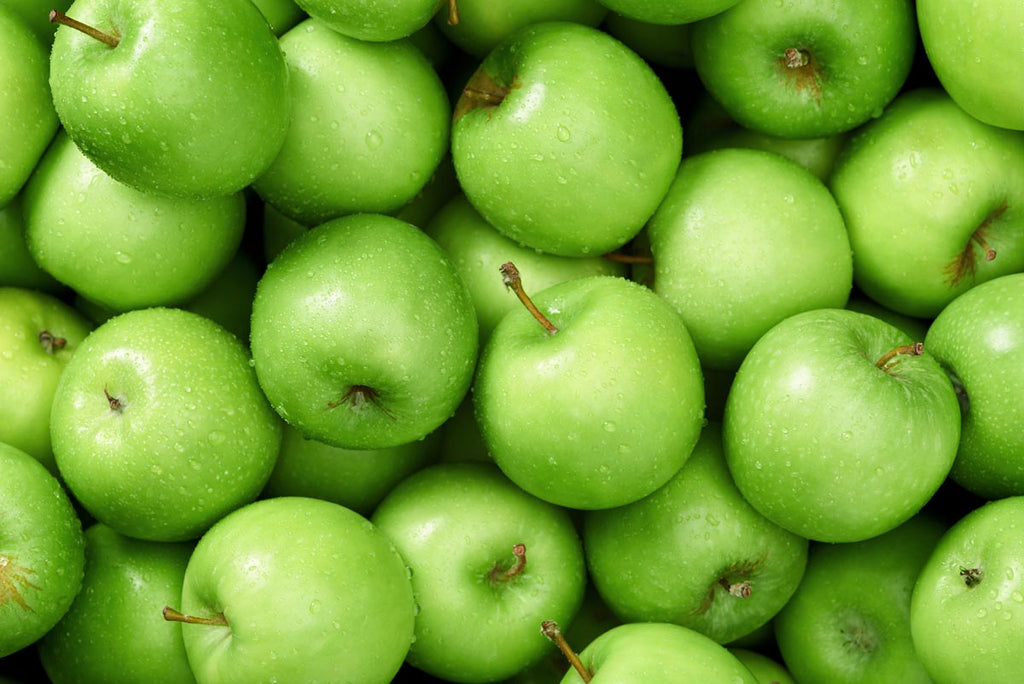We all know that fresh fruits and vegetables are full of lots of nutrients, fiber, and taste delicious. But did you know that one apple can also contain about 100 million bacteria?
It turns out that fresh fruits and vegetables are full of a wide assortment of microbes (bacteria, fungi, and viruses) that are very important for good health and a healthy gut microbiome. Produce contains hundreds of species of bacteria, many more than the few species a person can get from probiotic supplements.

The gut microbiome is the huge community of bacteria, fungi, and viruses that live in our intestines. The intestines are packed with trillions of these microbes, and it is estimated that about 500 to 1000 different species of bacteria live in the human gut.
All these microbes are important for proper immune system function, for getting nutrients from foods, protecting us from harmful microbes (pathogens), and metabolic health.
The foods a person eats plays a big part in determining what species of bacteria live in the gut microbial community. Some gut microbes are associated with health and some with inflammation and diseases – so you want to feed those that are linked to health. Eating a diet rich in plant foods, such as fruits and vegetables, feeds bacteria associated with health.
Harmful vs Beneficial Bacteria
For many years the focus has just been on the harmful bacteria and other disease-causing microbes that can occur on fruits and vegetables if they spoil or are not properly handled. These include E. coli, Listeria, Shigella, and Salmonella. These harmful microbes have resulted in serious disease outbreaks and even deaths, which is why it is so important to properly handle produce to prevent diseases.
But recent research has turned up something amazing - there is a wide diversity of many microbes occurring naturally on fruits, vegetables, and other foods that we eat daily. There are hundreds of different species of bacteria, with most known to be beneficial or harmless.
Each type of food has a different assortment of microbes on and in them. Even how the food was farmed, whether organic or conventional, makes a difference on what is found on and in the food. Who knew?

Wide Variety of Bacteria in Fruits and Vegetables
Discovering the wide variety of microbes found in and on produce and other foods has occurred only in the last decade with modern methods using genetic sequencing. In the past, researchers cultured bacteria, but that detected only a small percentage of microbes – generally the harmful bacteria. But with the new technology, suddenly the existence of a new microbial world opened up.
A study published in 2013 first drew wide-spread attention to all the bacteria living on fresh fruits and vegetables. University of Colorado researchers J. Leff and N. Fierer analyzed 11 types of produce (e.g. lettuce, tomatoes, peppers, peaches, strawberries) available in local grocery stores. They found that people are exposed to substantially different bacteria depending on the types of fresh produce they consume, where the produce had been grown, and whether it had been conventionally or organically farmed.
Each produce type had substantially different bacterial communities, but some types of bacteria were common across several types of produce. For example, tree fruits (e.g. peaches) shared some bacterial families, and vegetables grown close to the soil (e.g. peppers) shared some families. They also suggested that non-harmful bacteria may somehow inhibit or suppress harmful microbes found on produce surfaces.
Other researchers found that both animal (e.g. smoked salmon) and plant foods (e.g. herbs, masala spice mixes) also have unique and diverse microbiomes, and that not only where it was grown and farming practices (organic or conventional), but also how the food was handled and packaged are important in determining the bacterial communities of the food.

The amounts of bacteria found in produce can be staggering. Austrian researchers Wassermann et al. found that eating an entire apple, including the core and seeds, would result in the ingestion of about 100 million bacterial cells! And not eating the core drops the numbers to “only” about 10 million bacteria. Most of the bacteria are in the apple, and not on the skin.
They too found that the types of bacteria were somewhat different whether it was an organic or a conventionally produced apple, with a more diverse assortment of species and beneficial Lactobacillus species in the organic apples. The researchers thought that the variety of species found on organic apples was especially effective at suppressing harmful bacteria.
Introducing Good Bacteria to the Gut

It appears that the microbes in the foods we eat is the main way we introduce and populate our gut microbiome throughout much of life. The different microbes join with and interact with the microbes already in the gut, with some species staying and colonizing in the gut and others only there a short while before passing through. Importantly, all the microbes in foods that we eat are helping to maintain a healthy microbiome, one with lots of different species (diversity).
This is why a variety of fresh fruits and vegetables are so important to eat – each contributes different species. While eating fruits and vegetables is always better than not eating them, choosing organic produce over conventionally grown produce may be the better choice.
However, keep in mind that produce should be stored properly and washed before being eaten so as to not introduce harmful microbes into the body.

Eat Fresh Fruits and Vegetables For a Healthy Gut Microbiome
Eating a variety of real foods, including fresh produce, is the most important thing one can do for gut health. The variety and numbers of microbial species found in fruits and vegetables are much more than one can get from probiotic (beneficial bacteria) supplements. Instead, perhaps view microbe-rich fresh produce as probiotic foods to be eaten daily!


Leave a comment: